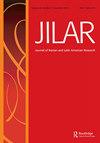Introduction Part Two: Forty Years of Latin American—Especially Mexican—History
IF 0.3
0 HUMANITIES, MULTIDISCIPLINARY
Journal of Iberian and Latin American Research
Pub Date : 2021-01-02
DOI:10.1080/13260219.2021.1954790
引用次数: 0
Abstract
The title roughly reflects the brief I was given when asked to give this talk: a talk that would be broad, reflecting my interest in Latin America (especially Mexico), and signaling the forty years during which the La Trobe University’s Institute of Latin American Studies has ploughed this furrow, sometimes uphill and in harsh weather. In any case, to the credit of those who put their hand to the plough, it has ploughed on. What is more, over the years, it has yielded a bumper harvest. Of course, to a historian like myself, the last forty plus years are a chronological space mostly inhabited by journalists (who often got things wrong) and political scientists (who, like the Gadarene swine, tend to rush headlong after the latest methodological wheeze or fashion). In other words, it is a nasty, slippery, muddy area, full of false dawns and failed predictions, therefore better avoided. As for the future, that is even worse, and I can do no more than echo the Scottish historian Tom Devine, who when asked his opinion of the imminent referendum on Scottish independence, replied: “the future is [. . .] not my period.” I should, first, qualify—matizar—my take on the last forty years, in at least three respects. First, there are brave souls known as contemporary historians who seek to add historical gravitas to journalistic or political-scientific flights of fantasy, but they are hampered by both the lack of available archival evidence and also hindsight (the ability to see long-term trends in context and to discern their dénouement). Historians do not live by archival bread alone, but without archival bread their diet is likely to be thin and unsustaining. Thus, within the big family of historical genres, contemporary history risks being the runt of the litter. A second qualification is that forty years does take us back across the no-man’s-land where journalism ends and serious history starts (and it starts for the reasons just mentioned: archival access plus hindsight). The liminal point—I pat myself on the back for at last managing to drop “liminal” into the conversation—is not, of course, fixed; it will vary according to the kind of history under consideration. But, taking into account common archival practices (such as the UK’s thirty-year rule), forty years—a long generation—gets us to the point at which serious history can be attempted. Therefore, in the case of Mexico, which I will discuss below, the events of the 1970s— the presidency of Luis Echeverría, student protest and repression, the so-called dirty war, trade union dissidence, the counter-culture, inflation, and the start of Mexico’s second oil boom—are now all the subject of serious research, combining archival, oral and other引言第二部分:拉丁美洲——特别是墨西哥——四十年的历史
这个标题大致反映了我被要求发表这篇演讲时的简短内容:这篇演讲内容广泛,反映了我对拉丁美洲(尤其是墨西哥)的兴趣,并标志着拉筹伯大学拉丁美洲研究所在40年的时间里,有时是上坡路,有时是在恶劣的天气下。不管怎样,值得那些把手放在犁上的人称赞的是,它一直在犁地。更重要的是,这些年来,它取得了丰收。当然,对于像我这样的历史学家来说,过去四十多年是一个按时间顺序排列的空间,主要居住着记者(他们经常把事情搞错)和政治科学家(他们就像加达伦猪一样,倾向于一头扎进最新的方法论喘息或时尚之后)。换句话说,这是一个肮脏、湿滑、泥泞的地区,充满了虚假的黎明和失败的预测,因此最好避免。至于未来,情况更糟,我只能附和苏格兰历史学家汤姆·迪瓦恩,当被问及他对即将举行的苏格兰独立公投的看法时,他回答说:“未来不是我的时代。”。首先,有一些被称为当代历史学家的勇敢者,他们试图为新闻或政治科学幻想增添历史的庄重感,但他们既受到缺乏可用档案证据的阻碍,也受到后见之明的阻碍(能够从上下文中看到长期趋势并辨别其结果)。历史学家不仅仅靠档案面包生活,但如果没有档案面包,他们的饮食可能会变得单薄而不受污染。因此,在历史流派的大家族中,当代史有成为垃圾中的矮子的风险。第二个资格是,四十年确实带我们回到了新闻业结束和严肃历史开始的无人区(这是因为刚才提到的原因:档案访问加上事后诸葛亮)。当然,临界点——我终于成功地把“临界点”放进了谈话中——并没有固定下来;它将根据所考虑的历史类型而有所不同。但是,考虑到常见的档案实践(例如英国的三十年统治),四十年——漫长的一代——让我们达到了可以尝试严肃历史的地步。因此,就我将在下面讨论的墨西哥而言,20世纪70年代的事件——路易斯·埃切弗里亚的总统任期、学生抗议和镇压、所谓的肮脏战争、工会异见、反文化、通货膨胀和墨西哥第二次石油繁荣的开始——现在都是严肃研究的主题,结合了档案、口头和其他
本文章由计算机程序翻译,如有差异,请以英文原文为准。
求助全文
约1分钟内获得全文
求助全文
来源期刊

Journal of Iberian and Latin American Research
HUMANITIES, MULTIDISCIPLINARY-
CiteScore
0.60
自引率
0.00%
发文量
22
 求助内容:
求助内容: 应助结果提醒方式:
应助结果提醒方式:


